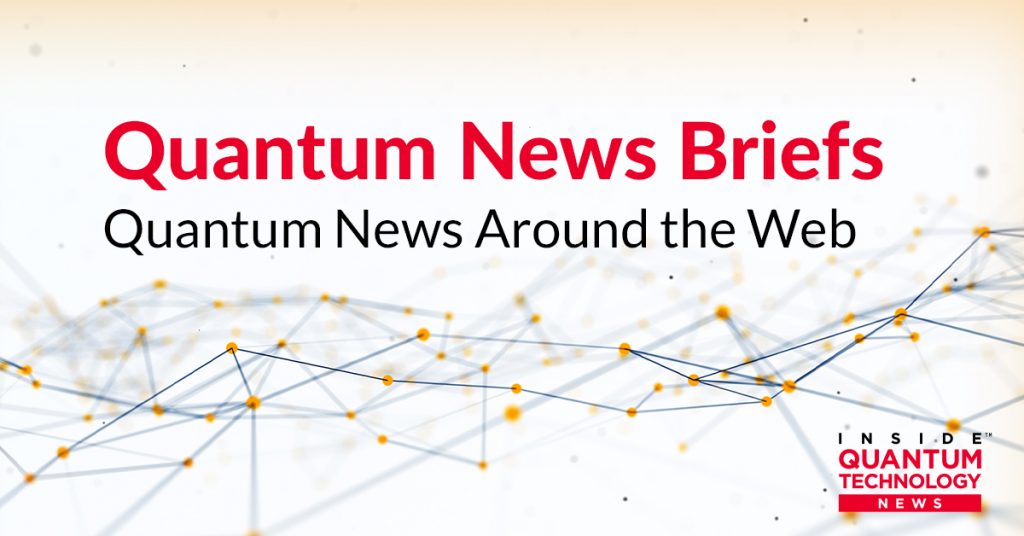Quantum News Briefs November 8 opens with “Trading Giant Sumimoto to market & distribute ColdQuanta technology in Japan” article that includes comments from an interview with Bob Sutor; followed by “Vivien Zapf Named Deputy Director of ORNL Quantum Science Center” and third is UNSW’s quantum breakthrough “100 Times Longer Than Previous” + MORE.
*****
Trading Giant Sumimoto to market & distribute ColdQuanta technology in Japan
News of the agreement followed by one day ColdQuanta’s completion of $110 million in Series B fundraising, which included funding from Sumitomo Corporation of Americas.
Sumitomo’s interest goes beyond nascent quantum computing efforts. The company has forged deals in the area of quantum key distribution as well. The company has forged deals in the area of quantum key distribution as well. Importantly, Sumitomo cites quantum sensors as an active area of interest. Such sensors promise much higher measurement sensitivity than conventional devices, and could find groundbreaking use in resource exploration as well as autonomous driving and navigation more generally.
New processing approaches continue to emerge from quantum computing startups. If successful, these approaches could expand the quantum horizon, according to Bob Sutor, VP and chief quantum advocate at ColdQuanta. Sutor is something of a herald when it comes to leading-edge technology. In nearly 40 years at IBM he held key positions evangelizing Linux, Web Services and, more recently, blockchain and quantum computing.
“What is going on with quantum technology is we are moving beyond the usual three suspects — that is, the three technologies: superconducting, ion trapping and photonics,” he told VentureBeat this summer in Boston. Click here to read original Venture Beat article in its entirety..
*****
Vivien Zapf Named Deputy Director of ORNL Quantum Science Center
Zapf is a scientist at the National High Magnetic Field Laboratory’s Pulsed Field Facility located at DOE’s Los Alamos National Laboratory, one of five core QSC partners along with ORNL, Fermi National Accelerator Laboratory, Purdue University and Microsoft. Having led the QSC’s quantum spin liquids subject area since the center launched in 2020, Zapf now succeeds ORNL’s Stephen Jesse, who has served as interim deputy director since January 2022.
In her new role, Zapf will collaborate extensively with QSC Director Travis Humble and other members of the leadership team to oversee research related to quantum materials, sensors and algorithms as well as continue the center’s steady stream of workforce development activities aimed at identifying and educating the next generation of quantum scientists and engineers.
At LANL, Zapf conducts research in quantum information science, quantum magnetism, magnetoelectronics and multiferroic materials, which are prized for their combination of useful magnetic and electrical properties. She received her bachelor’s degree in physics from Harvey Mudd College and earned her master’s degree and doctorate in physics from the University of California, San Diego, before completing a postdoctoral fellowship at the California Institute of Technology and subsequently joining LANL as a postdoctoral researcher in 2004.
Click here to read the original announcement in its entirety.
*****
UNSW’s quantum breakthrough “100 Times Longer Than Previous”
“Longer coherence time means you have more time over which your quantum information is stored – which is exactly what you need when doing quantum operations,” says Ph.D. student Ms. Amanda Seedhouse, whose work in theoretical quantum computing contributed to the achievement.
“The coherence time is basically telling you how long you can do all of the operations in whatever algorithm or sequence you want to do before you’ve lost all the information in your qubits.”
The more spins you can keep in motion in quantum computing, the more likely it is that information will be maintained during calculations. The calculation collapses when the spin qubits cease spinning, and the values represented by each qubit are lost. In 2016, quantum engineers at the University of New South Wales confirmed experimentally the concept of extending coherence.
Making matters more difficult, working quantum computers of the future will need to keep track of the values of millions of qubits if they are to solve some of humanity’s most difficult problems, such as the search for effective vaccines, modeling weather systems, and predicting the effects of climate change.
*****
Xiphera and Flex Logix Publish White Paper on eFPGA Post-Quantum Cryptography
Xiphera Ltd, a Finnish company designing and licensing cryptographic IP cores for FPGAs and ASICs, announced today that it has published a new white paper with Flex Logix. The paper explains how advances in quantum computing technology threaten the security of current cryptosystems and how this can be averted with Post-Quantum Cryptography (PQC) running on embedded FPGAs (eFPGAs.)
While quantum computing and its development offer answers to various computational problems, they also threaten the security of current cryptosystems. PQC systems respond to this growing quantum threat because they are based on mathematical problems that cannot be solved efficiently with Shor’s algorithm, or by any other known quantum computing algorithm. When PQC is implemented on eFPGA, it can provide the crypto agility that customers need to change the PQC algorithms, yet provide the performance, power and cost savings over other alternatives.Many organizations and associations will require PQC support on security systems in the near future. However, these requirements and the continuously changing PQC landscape requires a new level of crypto agility and the ability to update and change cryptographic algorithms in deployed systems.
The white paper discusses implementation of PQC algorithms on eFPGA and how this can deliver tremendous advantages to SoC designers. Not only can it allow the updating of PQC algorithms according to their development status, but it also enables designers to combine PQC with traditional cryptosystems and existing crypto modules in order to protect against unlikely but possible failures of the new PQC systems.
*****
Sandra K. Helsel, Ph.D. has been researching and reporting on frontier technologies since 1990. She has her Ph.D. from the University of Arizona.
